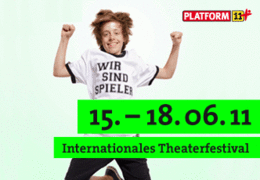3rd Annual Encounter Dresden Germany June 15 – 18 2011
The Annual Encounter of Platform 11+ brought together more than 100 artists from 12 European countries for the third year in a row, from the 15–18th of June 2011.
This year, South American artists provided an added attraction to the European meeting: The group ‘La Factoria’ from Santiago de Chile put on their play ‘Martin’, a play which rose out of the pro-ject ‘Schoolyard Stories in Ibero America’ .
Once again, the purpose of the Annual Encounter was to present the results of the project work which had been done in the preceding year, to reflect on experiences and to make new plans about tightening the strings of the European Network even more.
After the first Annual Encounter in 2009 in Budapest, and the 2010 Encounter in Palmela, Portugal which brought together visual artists and performers, the 3rd Annual Encounter in Dresden brought professionals and amateurs together. The focus of the Dresden festival was on the 8 co-produc- tions of the partner theatres. But of equal importance was the Youth Event with students from the partner school of tjg, Buergerwiese.
An Annual Encounter built on the founding ideal of the Platform 11+ project work. A crossover event: professional actors and visual artists involving themselves in creative activities with the target group with whom they share an equal footing.
LOOK! A SIGHTSEEKING TOUR
A different kind of sightseeing tour was put on by the pupils from the Buergerwiese Gymnasium for the international guests at the beginning of the encounter. The guests were invited to take part in the adventure ‘LOOK! A Sight Seeking Tour’, featuring the kids’ voices and the sounds of Dresden’s streets. Based on many different street-art activities, the kids showed the visi- tors their favourite places in a special way.
THE FESTIVAL
There was an extensive co-writing process prior to the co-productions. Authors from two, sometimes three different countries, devised texts in differing ways for the 11–14 year old target age group. These 8 plays (together with the 17 plays from the ‘National Phase’) have been published in the book ‘New Theatre Plays from Europe and South America’. These texts had already been premiered by each of the theatres as co-productions. In this way the collaboration between artists, directors and actors from different countries was continued: it was really all about working together and not merely being confronted with the results of other people’s work.
The fact that all the theatres completed both the complicated process of co-writing and that all of the rehearsal periods culminated in productions for the target age group proved the participating theatres work at a high professional level.
It goes without saying that such artistic endeavours cannot take place without conflicts. The participating artists, however, described this phase as an enriching experience rather than as a hindrance. This displays their open- ness for one another and the aspiration to discover the ‘European Value’ in a concerted, creative effort.
The 8 productions, which originated from the project, differed from one another in theme, form and length. The tjg. theater junge generation in Dresden/Germany with its variety of performance spaces and its big staff proved to be the ideal place for the Annual Meeting and its presentation.
Each play was performed at least twice. The majority of the audiences in the morning performances belonged to the target age group, the evening performance of the same play was seen by mainly festival participants. Dis- cussions about the viewed performance took place every evening, despite the fact that the days were long and full of activity. Authors, directors, the pro- duction team and performers, all had the chance to inform themselves about the working processes, about the difficulties and challenges involved and about what should happen to each of the plays in the future. It was different from ‘normal’ post performance discussions. It was more to do with reflecting over what it means to work together as Europeans than about opinions about the seen play.


